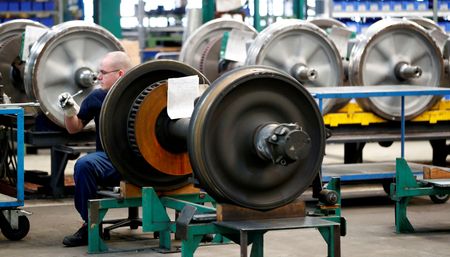By Maria Martinez
(Reuters) -German industrial production fell more than expected in July, driven mainly by weak activity in the automotive sector, spurring fears that Europe’s largest economy could contract again in the third quarter.
Production fell by 2.4% compared with the previous month, the federal statistics office said on Friday. Analysts polled by Reuters had predicted a 0.3% fall.
“Friday’s data is a cold shower for everyone hoping for a speedy recovery. In fact, it suggests that the bottoming out of industry still has a long way to go,” said Carsten Brzeski, ING’s global head of macro.
The recent weakening of sentiment indicators also suggests that there will be no rapid turnaround for the better, Commerzbank’s senior economist Ralph Solveen said.
“There is a growing risk that the German economy will continue to contract slightly in the third quarter,” Solveen said.
Production dropped by 8.1% in the automotive industry, weighing on the overall result. In June, automotive production rose 7.9%.
On a less volatile three month on three month comparison, production in May-July fell 2.7% compared with the February-April period.
“Weakness in German industry is one of the main reasons why we expect the German economy will broadly stagnate in the rest of this year,” said Franziska Palmas, senior Europe economist at Capital Economics.
The statistics office revised the figure for June to a 1.7% increase on the month from 1.4% previously.
Despite the upward revision, the slide in July more than reversed June’s increase.
“Industrial production is unlikely to come out of recession unless the external picture improves,” said Melanie Debono, senior Europe economist at Pantheon Macroeconomics. “The sharp drop in the trade surplus in July, the second in a row, does not suggest this is happening.”
The foreign trade balance showed a surplus of 16.8 billion euros in July, down from 20.4 billion euros in June.
German exports rose by 1.7% in July compared with the previous month, while imports rose by 5.4% on the month.
“The trends in manufacturing, imports and exports still look recessionary, highlighting the risk that the economy is now falling into a technical recession,” Debono said.
The German economy contracted in the second quarter, sparking fears of another recession, marked by two consecutive quarters of contraction.
(Reporting by Maria Martinez, Anastasiia Kozlova and Halilcan Soran, editing by Andrey Sychev, Christina Fincher and Hugh Lawson)





